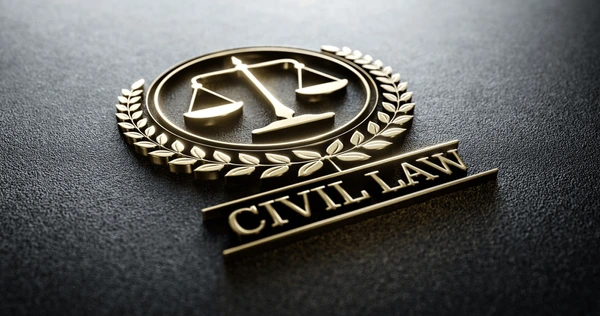Civil law comprises a set of rules and regulations that help resolve non-criminal disputes in nature. Generally, Possession of property is the most crucial aspect of civil law. If anyone interferes with the peaceful possession and enjoyment of the property, the person may seek an injunction order in civil court. Another aspect of the injunction is that a temporary injunction (ad-interim stay) can be granted at the court's discretion. We are experts in injunction suits and have a high success rate when it comes to injunction suits. We also handle partition, declaration, and all civil cases, including Will probate.

Characteristics of Civil Law Systems
Civil law systems are characterized by several key features:
Codification
Unlike common law systems, which rely heavily on judicial precedents, civil law systems are based on comprehensive codes that cover various areas of law. These codes provide detailed statutes and regulations that judges apply to specific cases. The emphasis on written law ensures clarity and predictability.
Inquisitorial System
In civil law jurisdictions, the judicial process often follows an inquisitorial model, where judges take an active role in investigating the facts of a case. This contrasts with the adversarial system in common law countries, where the parties present evidence, and the judge acts as a neutral arbiter.
Role of Judges
Judges in civil law systems are typically more involved in the fact-finding process and interpretation of laws. They are seen as public officials responsible for applying the law impartially. Their role is not to create law but to interpret and enforce the existing codes.
Legal Education and Profession
Legal education in civil law countries often focuses on mastering the legal codes and understanding the principles underlying them. Lawyers are trained to navigate these codes and provide legal advice based on the statutory provisions.
Areas Covered by Civil Law
Civil law encompasses a wide range of legal areas, each governing different aspects of private life and business transactions:
Contract Law
This area deals with agreements between parties, outlining their rights and obligations. It includes rules on the formation, performance, and termination of contracts, as well as remedies for breach of contract.
Tort Law
Tort law addresses wrongful acts that cause harm or loss to individuals or property. It provides remedies for damages caused by negligence, intentional harm, or strict liability.
Property Law
Property law regulates the ownership, use, and transfer of real and personal property. It includes rules on land ownership, leases, mortgages, and intellectual property rights.
Family Law
Family law governs matters related to family relationships, such as marriage, divorce, child custody, and inheritance. It aims to protect the rights and interests of family members.
Succession Law
This area deals with the distribution of a person's estate after death, including the rules for wills, intestacy, and the administration of estates.
Corporate Law
Corporate law regulates the formation, operation, and dissolution of companies. It covers issues such as corporate governance, shareholder rights, and mergers and acquisitions.
Civil Law Procedures
Civil law procedures are designed to resolve disputes efficiently and fairly. The process typically involves several stages:
Pleading Stage
The plaintiff files a complaint outlining the facts and legal basis for the claim. The defendant responds with an answer, disputing the allegations or presenting defenses.
Evidence Stage
Both parties gather and present evidence to support their claims. In civil law systems, judges play a proactive role in investigating and evaluating the evidence.
Trial Stage
A judge reviews the evidence, hears arguments from both sides, and renders a decision based on the applicable laws and codes. The decision is usually written and detailed, explaining the legal reasoning behind the judgment.
Appeal Stage
Parties dissatisfied with the judgment may appeal to a higher court, which reviews the case for legal errors and ensures the correct application of the law.
Conclusion
Civil law plays a crucial role in maintaining order and justice in societies by providing a structured framework for resolving disputes. Its emphasis on codification and legal certainty ensures that individuals and organizations can conduct their affairs with confidence and predictability. As legal systems continue to evolve, civil law remains a fundamental component of the global legal landscape, offering valuable lessons in the pursuit of fairness and equity.







